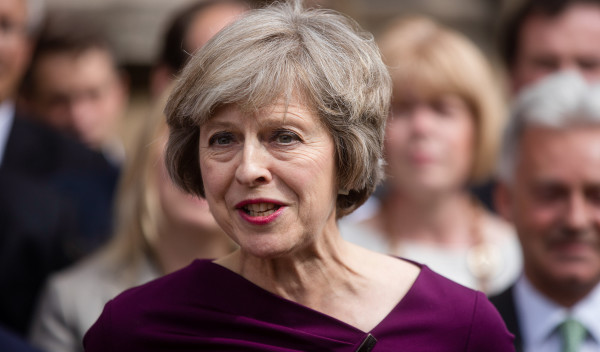

The Conservatives will abandon the state pension triple lock after 2020 and replace it with a new double lock, the party's general election manifesto revealed today (18 May).
The double lock will mean that pensions will increase in in line with earnings or in line with inflation, whichever is greater.
Unlike Labour, which is freezing the state pension age rises at 66, the Conservatives revealed they will will increase the state pension age in line with life expectancy if they are re-elected to government on 8 June.
Hugh Nolan, president of the Society of Pension Professionals and director at Spence & Partners, said: “The triple lock is unsustainable with our ageing population and so it is good to see the Conservative Party being honest about this uncomfortable truth.
"Pensions look like a typical battleground for this election with Labour promising benefits that might be unaffordable, the Lib Dems flying the flag for equality, and the Tories being ruthlessly realistic."
David Robbins, senior consultant at Willis Towers Watson, said the Office for Budget Responsibility assumes that, over the long term, the triple lock has the same effect as increasing the state pension by earning plus 0.34 per cent every year.
Using its methodology, the double lock works out at earnings plus 0.26 per cent.
So Mr Robbins said the value of affected state pensions would still be ratcheted up relative to average earnings, just by a bit less.
He said: "The 2.5 per cent part of the triple lock doesn't make any sense as a policy, but it served a political purpose: it was there to avoid a repeat of the 75p per week increase in the basic state pension that Gordon Brown awarded in 2000, when inflation was low.
"Seventeen years on, (Conservative leader and prime minister) Theresa May used that 75p increase as a stick to beat Labour with in the final prime minister's questions before the election.
"So it is hard to see her sticking rigidly to the double lock if inflation and earnings growth were both very low."
Tom Selby, senior analyst at AJ Bell, said the triple lock was an expensive policy and Mrs May has clearly sounded its death knell.
He pointed out Office for Budget Responsibility projections suggest retaining the triple-lock could cost £15bn more than earnings indexation by 2060.
Mr Selby said: “A double lock of inflation or earnings after 2020 will still ensure the state pension at least increases in line with the cost of living."
The manifesto also stated the Conservatives will "ensure that the state pension age reflects increases in life expectancy".
Willis Towers Watson's Mr Robbins pointed out "that could mean anything - it is how those increases are reflected that matters. The fastest timetable that the Conservatives were considering before the election would see the state pension age rise to 68 in 2030 - just in time to catch the population bulge from the 1960s baby boom."
One significant omission from the manifesto is any mention of tax relief.
Mr Robbins warned: " When it comes to the future of tax relief, election campaigns are more significant for what politicians rule out than for what they rule in and it looks as though a re-elected Conservative government would have left itself the flexibility to consider all options.
"If change is seriously considered, the Pension Isa model looks the most likely option, with the Lifetime Isa - which the manifesto flags up - providing a foot in the door for this."
Auto-enrolment
Malcolm McLean, senior consultant, Barnett Waddingham, said it was good to see that a Conservative government will continue to support the successful expansion of auto-enrolment to include small employers and the self-employed.
In the latter case, he said this was long overdue with all the evidence pointing to a continuing reduction in pension saving by the self-employed despite the fact that since the financial downturn in 2008 their numbers have increased considerably.
The collapse of the retail store BHS and the implications for its pension scheme were also nodded to with a manifesto commitment to strengthen the current powers of the regulators to ensure that pension savers, pensioners and prudent company directors are protected from unscrupulous business owners.
Edward Brown, partner at law firm Hogan Lovells, said: "Whilst some regulatory changes were expected post BHS, the manifesto is far more radical than the cautious Department for Work and Pensions green paper in February.
"Whether this will have the effect of stopping another BHS, or simply add cost and delay to legitimate commercial transactions, may depend on the approach The Pensions Regulator takes in practice."
Social care
The Conservative party promised people who move into residential care who already have the value of their property taken into account will start to receive state help when the value of their assets falls to £100,000, rather than £23,250.
But for those receiving care in their own home the value of their property will also now be taken into account in the means test – currently only their income and savings are taken into account – although they too will benefit from the asset increase from £23,250 to £100,000.
Barnett Waddingham's Mr McLean gave a cautious welcome to the social care changes.
He said: "They are certainly a step up from what we have now but will inevitably produce both winners and losers."
But Steve Webb, director of policy at Royal London, warned if these changes are implemented, more families will be at risk of seeing a large part of the value of their home wiped out by care costs later in life.
Mr Webb said: "Without an overall cap on care costs, those who need care for a long period of time could see more than half the value of their home taken by care bills.
"Paying for care looks set to become a regional lottery.”
stephanie.hawthorne@ft.com



